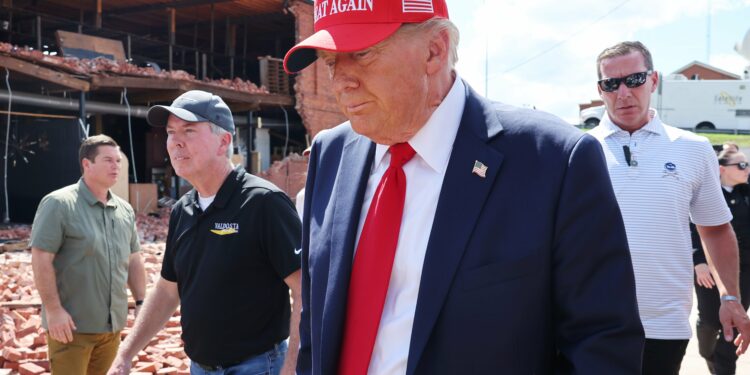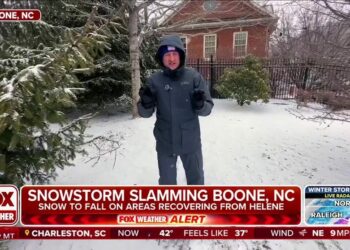Politicization of Hurricane Helene Response: A Case Study in Misinformation
!Hurricane Helene Effects on North Carolina
Overview of Current Political Climate
In a troubling turn of events, Donald Trump faces backlash from North Carolina’s second-largest newspaper for his controversial comments regarding the response to Hurricane Helene, which recently wreaked havoc across the southeastern United States. During his visit to Georgia last week alongside Governor Brian Kemp—a once adversarial figure who has since reconciled with Trump’s camp—the former president took the opportunity to criticize Vice President Kamala Harris and the Biden administration. He accused them of neglecting Republican regions during their relief efforts, despite evidence suggesting otherwise.
Unearthing Misinformation
Trump’s assertions have encountered rebuttals from a variety of sources, including Republican officials themselves. A lawmaker representing several counties severely impacted in western North Carolina dismissed Trump’s claims as “junk” conspiracy theories during an interview with Kellyanne Conway, known for her controversial media appearances before taking a step back from public discourse. The lawmaker particularly condemned accusations aimed at Harris for allegedly attempting to undermine support for communities affected by the disaster.
In response to Trump’s allegations, one prominent local publication—the Charlotte Observer—issued a scathing editorial criticizing his attempts to politicize what ought to be a humanitarian crisis. The piece pointed out that “there is no foundation for these baseless claims,” stressing that both state and federal entities have been actively working towards aiding those in distress.
The Fallout from Disinformation
The Observer elaborated that natural disasters should not serve as opportunities for political gain; instead, they should unite communities in their recovery efforts. They explicitly called out Mark Robinson, the state lieutenant governor aligned with Trump’s politics, noting how his propagation of misinformation coincided with personal scandals highlighted by investigative journalism.
Meanwhile, Vice President Harris also engaged directly with affected citizens during her visit to Asheville on Saturday. She reassured members of local volunteer organizations about ongoing commitment and support following this devastating event.
Urgent Response Amidst Chaos
Hurricane Helene’s deadly impact has left hundreds feared dead due to catastrophic flooding and landslides that devastated infrastructure throughout North Carolina—marking it as one of the deadliest storms in recent history within America over fifty years. With confirmed government aid surpassing $45 million already distributed among survivors, additional resources are being mobilized rapidly.
FEMA has already reached substantial numbers—distributing upwards of 1.5 million meals along with over 12 million liters of potable water—all crucial steps toward stabilizing life post-disaster conditions while also combating false narratives online about aid distribution methods based on ethnicity or other factors.
As part of ongoing recovery operations prompted by these alarming developments—and taking into account reports surrounding misinformation—President Joe Biden announced an increased presence in western North Carolina: deploying 500 National Guard members equipped with advanced technologies two days after initial troop deployments began.
His social media communications reiterated this commitment clearly:
“Today I ordered another 500 active-duty troops…to assist… We now have 1,500 troops combined.”
Additionally highlighting tangible congressional responses regarding resource allocation debates amidst chaotic border policies—I hope leaders can agree
that now isn’t the right moment—for such politicization discussions considering human lives at stake!
Conclusion: Crossroads between Policy and Humanitarian Needs
North Carolinians grappling under extraordinary pressures caused by Hurricane Helene’s aftermath need sound assistance devoid political interference or conspiratorial distractions muddying essential civilian aid networks designed specifically towards helping all citizens recover holistically—not just selected populations scattered across party lines!
Call-to-Action
It remains vital for media outlets serving diverse demographics responsibly challenge narratives misrepresenting governmental emergency actions—to protect democracy whilst ensuring transparent engagements benefit every citizen equally!





